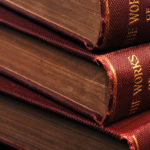The other day a good friend who reads these columns wrote to praise me for their “erudition.” Boy, do I have him fooled, I thought. A lifetime of more or less unplanned, haphazard reading for pleasure has given me a good deal to talk about in these excursions. So too has my professional reading for teaching and research in political theory and constitutional law. There I might claim to be “erudite”—learned and scholarly within fairly narrow confines. But I reject the “conscientious spirit” of the expert on the brain of the leech in Nietzsche’s Thus Spoke Zarathustra, who says that for the sake of his specialty he has “thrown away everything else; for its sake everything else has become indifferent to me,” and he is proudly ignorant of all but this one thing.
Not so in my case. My ignorance of many important things gnaws at me, as does the consciousness that the rest of my life is not time enough to learn what I want to know. As I wrote in this space in November 2020, there are numerous significant works of literature I haven’t read, and want to. The start of a new year, too, is a good time to resolve to read more widely and deeply in other ways as well. And lately my thoughts have turned to authors with whom I have some acquaintance but want to know better—specifically those philosophers and theologians who have shaped and transmitted the Catholic faith through the ages. In the works of some of these authors I have dabbled and foraged here and there, but I cannot claim a thorough knowledge of any of them, and that’s what I would like to reach for, even if true thoroughness remains beyond my grasp.
There are numerous significant works of literature I haven’t read, and want to. The start of a new year, too, is a good time to resolve to read more widely and deeply in other ways as well.
How have I reached my age, for instance, without having finished St. Augustine’s Confessions? A few years ago I read nearly all of his City of God, but something tore me away from it, and I need to finish it. And more than one friend has urged me to take up his On Christian Teaching. But Augustine’s complete works—have a look!—are, frankly, more than I want to tackle. Better, I think, to turn to Peter Brown’s biography to gain a fully rounded picture of the bishop of Hippo.
Start your day with Public Discourse
Sign up and get our daily essays sent straight to your inbox.Likewise it seems quixotic to try to plow through all the works of St. Thomas Aquinas. But having familiarized myself with parts of the Summa Theologiae, I really would like to get through it in its entirety—and maybe Notre Dame professor emeritus Alfred Freddoso will finish his new translation ahead of my reading (he’s almost three quarters of the way). Or perhaps I will start afresh with Thomas’s more concise Summa Contra Gentiles. Of introductions to Aquinas’s thought there is no shortage, with widely differing perspectives from Ralph McInerny to John Finnis to Edward Feser, to name a few. And it seems widely agreed that G. K. Chesterton’s brief life of Thomas is excellent.
I have grappled with Thomas More the philosopher, having taught his Utopia a number of times, and find him fruitfully enigmatic, but the essence of More the saint eludes me still, despite the excellent (if somewhat flawed) play and movie about him by Robert Bolt. His writings from the Tower therefore beckon me, including A Dialogue of Comfort Against Tribulation, and his Last Letters. And years ago a wise old priest recommended R. W. Chambers’s life of More, when I complained that a more recent biography had taken imaginative liberties with its subject’s state of mind.
Another saint whose prolific output threatens to demoralize all but the keenest specialists is the recently canonized John Henry Newman—just cast your eyes on the volume of his writings. Having read Eamon Duffy’s recent brief life of Newman and being already familiar with his famous Letter to the Duke of Norfolk, I think that in addition to his Apologia Pro Vita Sua I should read his two book-length “essays,” In Aid of a Grammar of Assent and On the Development of Christian Doctrine.
The twentieth century witnessed a real flowering of Catholic theology and philosophy. One obvious candidate for my plan of reading, it seems to me, is Jacques Maritain, beginning with an early work such as The Things That Are Not Caesar’s. I would welcome other suggestions from readers of Maritain, but think I shall certainly take up The Degrees of Knowledge. Other great French Catholic thinkers who claim my attention are Etienne Gilson (for instance, Being and Some Philosophers and The Spirit of Mediaeval Philosophy), Henri de Lubac (The Drama of Atheist Humanism, for starters), and Reginald Garrigou-Lagrange, whose Le Sens Commun has recently come out in English as Thomistic Common Sense.
The German Catholic philosopher Josef Pieper made a virtue of brevity, writing many compact little books, the most famous being Leisure the Basis of Culture. I have particularly profited from his Abuse of Language—Abuse of Power, which I mentioned in a previous column, and I will certainly add The Four Cardinal Virtues to my plan of reading in future. St. Augustine’s Press, I should say, is to be commended for publishing twenty of Pieper’s short works in the United States. All appear to be worth reading.
No doubt the greatest German Catholic thinker of the last century, though, is Joseph Ratzinger, Pope (now emeritus) Benedict XVI, whom a learned theologian friend of mine (not a Catholic himself) has called his second favorite theologian, after only Aquinas. His encyclicals and other papal writings are sparkling in their orthodox clarity, and one can find the same qualities throughout his long career in such volumes as Truth and Tolerance. I’m abashed to say I’ve never read his Introduction to Christianity, which is said to have brought many readers to the faith. And I will add to my reading list the trilogy he wrote on Jesus of Nazareth in his “private capacity” during his pontificate.
There are still more treasures of the faith that I could not mention here, and many you will think of yourselves. These are milestones I hope to stride past in years to come.
Benedict’s great predecessor, Pope St. John Paul II, looms over the Church of the late twentieth century as its most consequential figure. For his moral leadership in world affairs, for his sponsorship of the Church’s new Catechism, and for his own landmark encyclicals developing key doctrines, he has perhaps no equal in the modern age. I have to confess here that I have yet to tackle George Weigel’s two volumes of biography of John Paul the Great (sorry, George)—but I will! And I look forward to the saint’s recently published Teachings for an Unbelieving World.
I had the great pleasure of getting to know Michael Novak a little in his final years, and the privilege of seeing his memoir Writing from Left to Right before its publication. Novak’s thought, in such works as the once-influential The Spirit of Democratic Capitalism, is out of fashion among Catholic intellectuals these days. More’s the pity, in my view. Like his contemporary Fr. Richard John Neuhaus (see the latter’s The Naked Public Square and American Babylon) Novak wrote in a vein that treated the faith as compatible with the American liberal experiment, following in the footsteps of Fr. John Courtney Murray, whose We Hold These Truths is more criticized than read nowadays, and whose The Problem of Religious Freedom is unjustly neglected and should be reprinted. More Novak, Neuhaus, and Murray will be on my reading list.
Though I write this in January, dear readers, of course I do not expect to get through such a plan of reading in a year. And there are still more treasures of the faith that I could not mention here, and many you will think of yourselves. These are milestones I hope to stride past in years to come. Erudite? Not yet, not by a long shot. Wish me luck.














